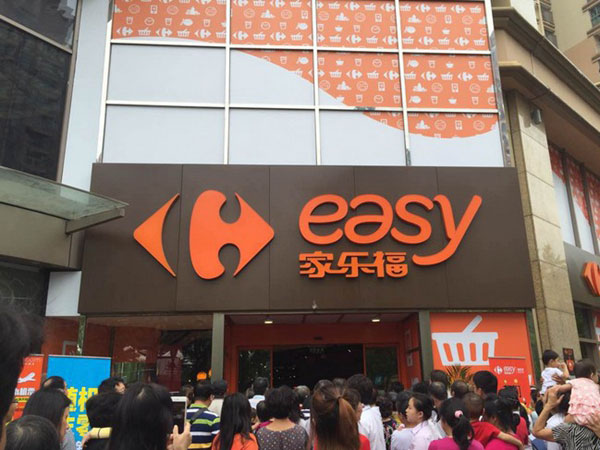Carrefour China's convinience store Easy Carrefour in Shanghai Photo: www.fruitnet.com
One of the major Chinese shareholders of Carrefour China is to sell off its stake amid a “bleak winter” for foreign retailers in China. Although the French multinational soon announced a buy-back program for revitalizing its embattled China operation, it is obvious foreign retailers are under pressure to gain profits amid falling economic growth and rising competition.
Liaoning Chengda Co., a state-owned conglomerate in Dalian, recently announced that it is to sell all its shares in its several joint ventures with French multinational retailer Carrefour for 0.42 billion yuan.
The Chinese shareholder publicly stated that “considering Carrefour’s long-term development outlook in China, it has made the decision (of selling all Carrefour equities) in an effort to push industrial restructuring and optimizing structural reform.”
Of the six joint ventures to be sold by the Chinese boss, five have posted losses in the first half of 2016. The store in Shenyang, capital of northeast China’s Liaoning province, booked a loss of 63.8 million yuan, while the total loss of the six stores reached 0.1 billion yuan.
Countering widespread suspicions that Carrefour may be forced to withdraw from China, Carrefour China stated that it would “continue to maintain and expand its China operation by opening more convenient stores, online malls and increasing investment in logistics & distribution centers.”
“Carrefour built joint ventures and stores with Liaoning Chenda in six cities. Its headquarters have confirmed that the two parties are now under negotiation, and Carrefour plans to buy back all equities from Liaoning Chengda,” an industry insider familiar with Carrefour China told the Nanfang Metropolis Daily.
The PR department of Carrefour China endorsed the news by saying that the company plans to buy back all shares from Liaojing Chengda. There is no clear-cut timetable, but it will go by required procedures.
Liaoning Chengda, a wholly state-owned company established in 1995, operates in the fields of biotech pharmaceutical, trade and commerce, energy development and financial services. According to a research report by BOC International, returns from financial services constitute major part of the conglomerate’s net profits.
In April, 2002, Liaojing Chengda signed equity transfer agreement with Carrefour to establish six joint ventures spanning four provinces. The company disclosed it has totally invested 0.22 billion yuan in the Carrefour project on November 17 the same year.
Winter for foreign investment
Carrefour’s Q3 financial report shows that its sales in Asian operations slid by 5% annually, while Carrefour China suffered from a 7.8% drop in sales.
Under pressure to make a profit, Carrefour China has shut down stores in 13 cities. According to Linkshop, a retail news and reports platform, in 2015, Carrefour totally shut down 18 stores, more than the ones it opened. The first half of 2016 saw the trend continue with the French retailer closing anther three stores in China.
Carrefour is not the only multinational retailer being affected by slowing economy and strong competition from online shopping spree in the country. The Lotus Market, owned by Thailand’s CP Group, also declared a loss in the first half of the year. British retailer Marks & Spencer and Malaysia’s Parkson are all reported to be shutting down shops.
The CP Group is one of the first major foreign investors coming to China, with its Lotus Market currently running 60 shopping malls in the country. For many years, the company’s financial reports stressed that it is one of the biggest foreign investors to maintain a long-term presence in China.
Lotus Market saw revenue drop by 3.2% in the first half, with a total loss of 63.87 million yuan. The retailer has confirmed that it will lay off 4% of employees in China.
This November has also seen Marks & Spencer, the biggest retailer in the UK, close down all its 10 stores in the Chinese mainland. Parkson, the biggest department store in Malaysia, posted a loss of 0.124 billion yuan in the first half and closed its store in Beijing.
The troubles of foreign retailers are connected with a boom in online shopping and the slowing economy in China. Total retail sales of consumer goods during the first 10 months rose to 26.96 trillion yuan with a year-on-year growth of 10.3%. Compared with the over 20% growth of the previous years, the slowing-down is quite obvious. On the other hand, online shopping has been prospering. Under the circumstances, both domestic and foreign offline stores are facing big challenges.
Carrefour aims for reform
“Carrefour is not innovative enough and it’s slow in making decisions which are main reasons for its decline,” Ding Liguo, an expert on retailing, was quoted as saying. “China’s retail industry is transforming dramatically, with shopping malls shrinking while boutiques and convenience stores burgeoning,” Zhu Danpeng, a researcher with the Institute of Food Business, said.
Apparently, Carrefour has recognized the problem and aims to catch up. The 21st Century Business Herald reported that Carrefour has announced to kick off online mall operation on November 22 in South China’s Wuxi and Suzhou, indicating the multinational retailer is undertaking its reform and transformation. Besides, like some other foreign retailers in China, Carrefour is also banking on convenience stores for a turnaround.
Zhu Danpeng noted that with changes in China’s consumption habits, convenience stores targeting individual consumers are becoming more vibrant due to their flexibility and low operational costs.
Thierry Garnier, the vice president of Carrefour and CEO of Carrefour China, recently expressed his belief in the future of shopping malls, while stressing that more shopping malls will be opened in central or western China, and convenience stores will become a trend in first-tier cities. Now, there are more than 10 Easy Carrefour convenience stores in Shanghai.
